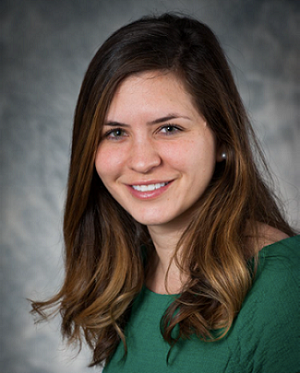Superfund Research Program

Amanda Armijo, DVM, Ph.D., of the Massachusetts Institute of Technology (MIT) is the 25th recipient of the Karen Wetterhahn Memorial Award. This award recognizes an outstanding graduate student or postdoctoral researcher who exhibits qualities of scientific excellence. Armijo received the award December 15 at the NIEHS Superfund Research Program (SRP) Annual Meeting in Raleigh, North Carolina.
Armijo is a postdoctoral veterinarian-scientist at the MIT SRP Center under the mentorship of John Essigmann, Ph.D., James Fox, DVM, and Bevin Engelward, Sc.D. She was selected for the Wetterhahn Award for her research on N-Nitrosodimethylamine (NDMA), an emerging contaminant of concern found in multiple Superfund sites and linked to a childhood cancer cluster near the Olin Chemical Superfund Site in Wilmington, Massachusetts.
Discovering an alarm bell in the body
Armijo has combined her knowledge of DNA, toxicology, and comparative medicine toward developing mouse models to study how NDMA damages DNA. She uncovered a pattern of DNA mutations in liver cells detectable only 10 weeks after exposure to NDMA, long before the tissues would show signs of disease. According to Armijo, these patterns may be able to serve as an alarm bell in the body for NDMA exposure.
Through her work, Armijo has added further proof NDMA causes DNA mutations and has shown that studying mutation patterns can help reveal the mechanistic underpinnings by which NDMA causes disease.
"If we can understand how natural differences in DNA repair in the general population affect the mutational patterns of NDMA we measure, we will be a few steps closer to understanding what makes one person more or less vulnerable to NDMA damage," Armijo explains. "That understanding may, in turn, inform strategies for remediation, intervention, and prevention of cancer and other diseases associated with environmental exposures."
Lifting up diverse students in science and medicine
Along the way to her research goals, Armijo also hopes to support other students like her – female students in traditionally male STEM fields and students from ethnic minorities or from areas with lower access to educational opportunities.
"As a first-generation college graduate, I have overcome many hurdles to get where I am now," Armijo says. "The mentorship and support I received along the way is something I actively emulate for the next generation of minority scientists, so I have taken time to mentor and counsel other students. My dream is to make the largest impact that I can toward making the experiences of those who come after me more equitable."
Armijo's mentor, Bevin Engelward, Sc.D., director of the MIT SRP Center, points to Armijo's dual passions of research and support of other students as a combination that will make her impactful in the laboratory as well as in the community.
"Dr. Armijo truly embodies the values of research excellence and public service of Dr. Karen Wetterhahn," Engelward says. "One of Dr. Armijo's biggest goals is to give back. For her, this is as high a priority as excelling in research. She is especially eager to help young women and minority students."
Armijo earned her Ph.D. in Molecular and Medical Pharmacology from the University of California, Los Angeles and her Doctor of Veterinary Medicine degree from Cornell University. While in her program at Cornell, Armijo remotely mentored UCLA undergraduates from ethnic minorities who were interested in pursuing careers in research or veterinary medicine. She has previously volunteered with children in foster care or experiencing homelessness and has participated in programs that provide affordable veterinary care to low-income community members.
"Dr. Armijo is a great role model," says John Essigmann, another of Armijo's mentors and a professor of chemistry, toxicology, and biological engineering at MIT. "She has both the background and the personality to become a leader in the field of clinical toxicology."
A future in translational research
Having found a home and a purpose in her current field, Armijo hopes to continue along her current path of becoming a veterinarian-scientist performing translational research in the field of immunotoxicology.
Working at the intersection of environmental immunotoxicology and human and animal diseases, she aims to advance understanding of the mechanisms of how environmental exposures cause immune dysfunction. Armijo sees her parallel goal of nurturing the careers of students from groups that are underrepresented in STEM as equally important.
"Promoting diversity in STEM fields will contribute to global health by simultaneously protecting and improving the health of both humans and animals," she says.


